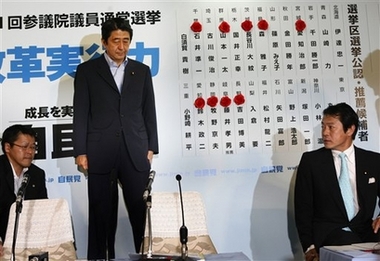Abe defeat could impact support for US
(AP)Updated: 2007-08-03 21:36
TOKYO - Prime Minister Shinzo Abe's electoral defeat may threaten Japan's support of US-led operations in Iraq and Afghanistan, as an energized opposition seeks to redefine the country's relationship with Washington.
 Japanese Prime Minister Shinzo Abe, left, stands next to the election results board as senior party member, Shoichi Nakagawa, right, looks on after learning the return of the upper house elections at the Liberal Democratic Party headquarters in Tokyo Sunday, July 29, 2007. [AP] |
As the top US ally in East Asia, Japan was a staunch supporter of the invasion of Iraq, dispatching troops there in 2004. Ground troops no longer remain, but Japan's air force continues to transport coalition personnel and supplies from Kuwait to Iraq, while Japanese ships in the Indian Ocean provide logistical support for US-led operations in Afghanistan.
While those missions have been unpopular with the Japanese public, many of whom say they violate the nation's pacifist constitution, Abe's ruling Liberal Democratic Party has always had enough political clout to keep up its support.
That is quickly changing.
Fresh off its victory at the July 29 elections for parliament's upper house, the main opposition Democratic Party of Japan has declared it will oppose extending the military's operation supporting coalition forces in Afghanistan.
The mission, which Japan's parliament approved under a special law, expires in November. The LDP wants parliament to extend that law, perhaps for another year; the Democratic party is making that difficult.
The Democrats have also said they want to end Tokyo's Kuwait-based air operations, saying Japan's international efforts should be channeled through the United Nations, not the US
"Our diplomacy should not be subservient to the US," party Secretary-General Yukio Hatoyama said Friday. "We should express Japan's position more assertively through our diplomatic and defense policies."
The looming standoff over Japan's foreign policy highlights Abe's stumbling fortunes and a dramatic reversal of the stellar support he enjoyed when he took over from his popular predecessor, Junichiro Koizumi, less than a year ago.
Promising to build a "beautiful Japan," Abe won points for mending strained diplomatic ties with South Korea and China, and has boldly pushed to revise the constitution to allow Japan's military to take a more active role in global security. Abe argued that Japan needs to ease its restrictions on the military to better enable its troops to help allies in times of crisis.
But a series of gaffes and scandals involving key ministers, as well as a huge pensions debacle, has greatly eroded Abe's political capital, culminating in Sunday's defeat - and forcing the embattled prime minister to turn inward, focus on rebuilding his Cabinet and clean up the pensions system.
But the Democrats will still struggle to force major change.
Although the opposition outnumbers the LDP in the upper house, the ruling coalition still controls the more powerful lower house of parliament and can shoot down most of the other chamber's votes or motions.
Moreover, few expect the Democrats to suggest that Japan completely part ways with the United States. Japan remains heavily dependent on the US for security, with some 50,000 US troops deployed across Japan under a mutual security pact. Tokyo's own Self-Defense Forces are strictly limited by the constitution.
"The parties will realize the need for some sort of compromise over Afghanistan," said Tomoaki Iwai, a political science professor at Nihon University in Tokyo. "Both sides know the US-Japan relationship is just too important for Japan."
Regardless, Abe will likely be forced to make concessions to the Democrats, analysts say. Abe could agree to a shorter extension of the Afghanistan mission, for example, or to strengthening parliamentary control - a measure that would make it easier for Tokyo to pull its troops out at short notice.
This possibility has US officials worried.
"I think the Japanese government certainly understands that Japan is a potential victim" of a terrorist attack, Tom Casey, a State Department spokesman, told reporters Wednesday in Washington.
"There's no question in our mind about the commitment of the Japanese government and the Japanese people to work with us on counterterrorism issues," Casey said.
Members of Abe's Cabinet have also heavily criticized the Democrats, with Defense Minister Yuriko Koike saying earlier this week that slighting the US would be detrimental to Japan's national interest.
Abe appealed to the Democrats for a compromise.
"The activities of the Self-Defense Forces are highly appreciated by the international society," Abe told reporters Wednesday. "From that standpoint, I would urge the DPJ to cooperate."
|
|
|
||
|
||
|
|